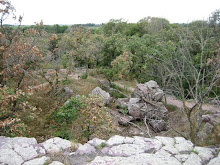Creepy Alyosha
I am on page 132 of The Brothers Karamazov. As you can tell, I have a long way to go in the book, and we will see whether my impressions are correct or not. But here's a temporary thought. While I am impressed with Alyosha, the "good guy," I am a little worried, too, that some earnest readers who are not basically like Alyosha, but who wish to emulate his good qualities, may not be able to because he seems to posess them inherently. In other words, I may wish to be Russian, but simply can't because, well, I wasn't born that way. Similarly, old Karamazov seems inherently reprehensible. I know that is all problematic in terms of existential choice, but really, this is how it currently looks.
My daughter, though not a prodigious pianist, shows some very respectable talent. For example, on her own she transposed the otherwise hopelessly perky "Alouette" into a minor key that sounds really awesome; she calls it "Creepy Alouette," I believe. Now, I'm not saying I prefer "creepy" things to cheerful things, but here's a tie to Alyosha. Alyosha "confesses" that he is capable of doing very bad things, and that he is a person subject to passions just as much as his brother, though he has not as yet taken more steps up the ladder. There is the choice element, but still and all, Aloysha's nature seems to be nicer to start with. He would be transposing himself, rather than living out a minor-key composed life.
What is the point of this? I guess it brings me to think of Jean Valjean. In him, I think we have a ho-hum guy who chooses (admittedly under very absurd circumstances, i.e., a rough social and penal structure--"When Valjean was judged, God was not there") to become hard, and then, under very gracious circumstances (the Bishop), choses to lead a compassionate, atoning life. In a word, can more people become Valjean than Alyosha?
You may at this point wonder why one would wish to emulate a literary character at all . . .

